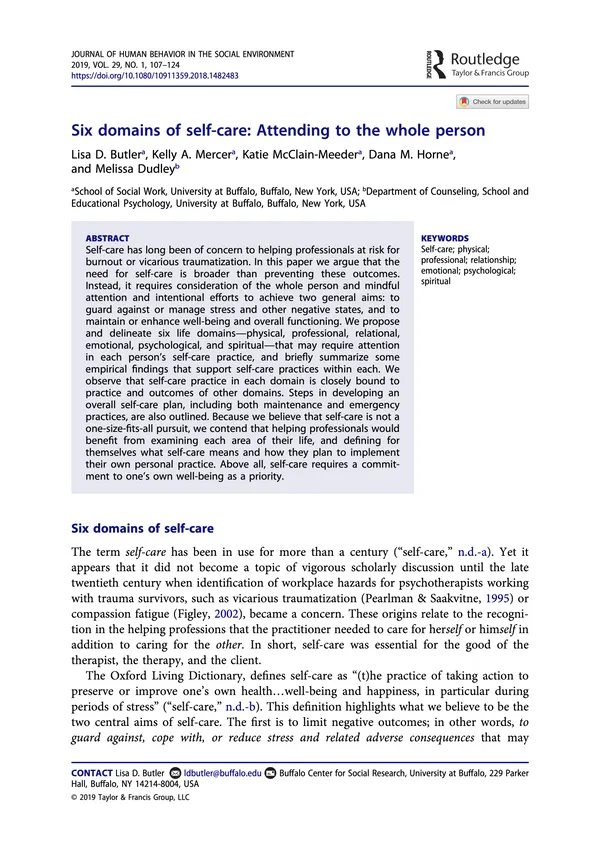

It's 1:00 AM and instead of sleeping, I found this interesting article from Butler et al (2019) regarding their proposed key domains to self-care that I’d like to share in my late-night reading digest with everyone.
Oxford Dictionary defines self-care as "the practice of taking action to preserve or improve one’s health… well-being and happiness, particularly during periods of stress". It highlights 2 key aims of self-care: limiting negative emotions and promoting broad positive outcomes.
In short, self-care is about taking proactive steps to enhance resilience and overall well-being. The article aims in establishing a more solid conceptual foundation & whole-person perspective to guide empirical investigations & ground guidelines for self-care practices.
They proposed 6 domains for self-care: Physical, professional, relational, emotional, psychological & spiritual. These are derived primarily from Maslow’s Hierarchy of Needs, which arranged human needs as a pyramid in order of importance, culminating with self-actualisation. According to Maslow, we have five categories of needs: physiological, safety, love, esteem, and self-actualization. In this theory, higher needs in the hierarchy begin to emerge only when people feel they have sufficiently satisfied the previous need.

Coming back to the article, the first domain–physical–involves tending to the needs of the physical body to achieve or support optimal functioning and to avoid breakdowns or deterioration within systems. This includes sleep quality, proper nourishment, frequent exercise and more.
Meanwhile, the relational domain refers to the care of one’s relationships i.e. the efforts we make to maintain and enhance our interpersonal connections with others. This network of people we regularly interact with helps provide emotional & social support in times of need. One discussion of this particular domain that caught my attention is whether virtual social involvements (which are becoming more prevalent now) can enhance or substitute for more traditional (real world) social support. Findings so far seem to indicate otherwise.
For the next domain (emotional), the authors conceded that it’s incredibly difficult to discern the abstract, arbitrary and already-blurred lines that distinguish between relational, emotional and especially psychological self-care. For purposes of differentiating domains of self-care, they defined emotional self-care as "practices that are engaged in to safeguard against or address negative emotional experiences as well as those intended to create or enhance the positive emotional experience and well-being". They associate the emotional domain with one’s personal 'go-to' ways of coping with difficult emotional states & reducing negative emotional experiences a.k.a. your coping mechanism. A simple emotional self-care directive could be: figure out what makes you happy & do more of it.
Next, the psychological domain is concerned with practices aimed at "pursuing and satisfying intellectual needs and purposeful and reflective efforts to understand and attend to the overall needs of the organism". What sets psychological and emotional domains apart is mostly that the former’s activities are primarily experienced as products of the mind and are more intellectual in nature. This includes music, deep talks, playing games etc. Another interesting aspect that they deemed essential to this domain is self-awareness, defined as "unbiased observation of one’s inner experience and behaviour”. It is integral to the development of one’s self-care plan, seen as a central aspect of psychological self-care.
The personal self-care plan is elaborated on in detail in the article. The steps include identifying how one currently copes with stress & deciding whether and which changes are needed**. Then, a maintenance plan is developed to specify the practices to be employed as a habit. Another crucial step is to identify possible barriers to the implementation of these new aspects of practice and specify how to address each. Lastly, one must have a conscious, mindful commitment to self. Sharing one’s plan with others to obtain their support can help in that regard.
As the authors have pointed out, it is important to note that there is no one-size-fits-all guideline about overall self-care practice. The person-practice fit is critical, and that can only be accurately defined by each practitioner.
Now that the self-care plan is out of the way, let’s go back to the final domain: Spiritual. It’s how we view ourselves in the context of the broader world; the pursuit of purpose & deeper meaning in life. It is often rooted in religious faith, although secular versions do exist. Spirituality is deeply personal. It can vary from centring on organized religion and belief in a God or gods to establishing a deep connection to humanity, or nature and the earth. Regardless of your affiliation, they all can yield experiences of awe, wonder, and transcendence.
For faith-based spirituality, even the mere participation in activities of organised religion, such as attending a faith service, religious readings, singing, or prayer, allows some individuals to feel more deeply connected: both from a higher power and the other believers. As for non-faith-based spirituality, meditation is a common practice that involves contemplation of one’s relationship with one’s surroundings. It allows for the reflection of one’s role within the larger cosmos. Even connecting with nature through walking in the woods can help.
In conclusion, the article presents an interesting general framework that anyone can adopt for crafting personalised self-care strategies. While it is inherently subjective, a common thread in all self-care efforts is making & honouring a commitment to one’s well-being.
Feel free to read the full-text PDF from ResearchGate here!